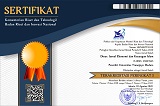Implementation Of Halal Value Chain In Business In Islamic Boarding Schools
Abstract
This study aims to determine the implementation of the halal value chain in the Islamic Boarding School business. In this article, the focus of the study is on the oyster mushroom business, starting from the process of cultivating oyster mushrooms to being processed food, and the sales process at the Nurul Amanah Islamic Boarding School, Basanah, Bangkalan.
This type of study is a qualitative study with observational study methods. While the data collection methods were carried out through observation, interviews, and documentation.
The results of the study on the application of the halal value chain at the Nurul Amanah Islamic Boarding School Bangkalan indicate that the input process for making oyster mushroom raw materials, processing oyster mushrooms into mushroom chips, and product marketing processes. The input process for making oyster mushrooms starts from providing a place, making planting media, making baglog and sterilizing processes, making mushroom seeds and sowing seeds, maintenance, and harvesting. Then the management process into mushroom chips starts from the ingredients, the frying process, drying, product packaging and marketing stages. Everything is in accordance with Indonesian Government Regulation No. 31 of 2019 concerning Implementing Regulations of Law No. 33 of 2014 concerning Guaranteed Halal Products and a List of Non-Critical Materials (Halal Positive List of Materials) for its supporting materials. It can be concluded that the Nurul Amanah Islamic Boarding School has implemented a halal value chain.
Keywords
Full Text:
PDFReferences
Ahla, A., Hulaify, A., Iman, H., & Budi, S. (2020). Strategi Pengembangan Ekonomi Syari’ah Melalui Penguatan Halal Value Chain (Studi Kasus pada Industri Pariwisata Halal di Kota Banjarbaru).
Annisa, A. A. (2019). Kopontren dan Ekosistem Halal Value Chain. Jurnal Ilmiah Ekonomi Islam, 5(01), 1. https://doi.org/10.29040/jiei.v5i01.398
Baharuddin, K., Kassim, N. A., Nordin, S. K., & Buyong, S. Z. (2015). Understanding the Halal Concept and the Importance of Information on Halal Food Business Needed by Potential Malaysian Entrepreneurs. International Journal of Academic Research in Business and Social Sciences, 5(2). https://doi.org/10.6007/ijarbss/v5-i2/1476
Bank Indonesia. (2020). Bersinergi membangun ekonomi dan keuangan syariah.
Bate’e 1), M., Panggabean, E. L., & Mardiana, S. (n.d.). Jurnal Ilmiah Pertanian (JIPERTA) Respon Pertumbuhan dan Produksi Beberapa Varietas Jamur Tiram Pada Kombinasi Media Serbuk Limbah Pelepah Kelapa Sawit dan Serbuk Gergaji Growth Respond and Production of Oyster Mushroom on The Combination of Palm Waste and Sawdust. Jurnal Ilmiah Pertanian (JIPERTA), 2(1), 22–30. Retrieved July 26, 2021, from http://jurnalmahasiswa.uma.ac.id/index.php/jiperta
Faradina, C. (2011). Evaluasi proses sertifikasi halal indonesia di Lembaga Pengkajian Pangan, Obat-Obatan, dan Kosmetika Majelis Ulama Indonesia (LPPOM MUI). http://repository.ipb.ac.id/handle/123456789/51185
Frendi Riyanto. (2010). Pembibitan jamur tiram (pleurotus ostreatus) di balai pengembangan dan promosi tanaman pangan dan hortikultura (BPPTPH) Ngipiksari Sleman, Yogyakarta. https://digilib.uns.ac.id/dokumen/detail/15541/Pembibitan-jamur-tiram-pleurotus-ostreatus-di-balai-pengembangan-dan-promosi-tanaman-pangan-dan-hortikultura-BPPTPH-Ngipiksari-Sleman-Yogyakarta
Hudaefi, F. A., & Heryani, N. (2019). The practice of local economic development and Maqāṣid al-Sharī‘ah: Evidence from a Pesantren in West Java, Indonesia. International Journal of Islamic and Middle Eastern Finance and Management, 12(5), 625–642. https://doi.org/10.1108/IMEFM-08-2018-0279
Mu’awwanah, U., Mardiyah, A., & Utami, A. S. (2021). Penguatan Halal Value Chain dalam Pemasaran Abon Lele melalui Adaptasi Digital. Mujtama’: Jurnal Pengabdian Masyarakat, 1(1), 65–73. http://jurnal.unmuhjember.ac.id/index.php/Mujtama/article/view/5134
Perencanaan, B., & Nasional, P. (n.d.). Kementerian Perencanaan Pembangunan Nasional.
PP No. 31 Tahun 2019 tentang Peraturan Pelaksanaan Undang-undang Nomor 33 Tahun 2014 tentang Jaminan Produk Halal [JDIH BPK RI]. (n.d.). Retrieved July 26, 2021, from https://peraturan.bpk.go.id/Home/Details/161941/pp-no-31-tahun-2019
Soenanto, H. (2019). Jamur Tiram: Budidaya dan Peluang Usaha. Aneka Ilmu.
Subianto, & Pratiwi. (2018). Rantai nilai dan perspektif kesadaran masyarakat muslim akan makanan halal. In journal.uii.ac.id (Vol. 1). https://journal.uii.ac.id/CIMAE/article/view/13362
Tieman, M., van der Vorst, J. G. A. J., & Ghazali, M. C. (2012). Principles in halal supply chain management. Journal of Islamic Marketing, 3(3), 217–243. https://doi.org/10.1108/17590831211259727
Zulkifri. (2018). Pondok Pesantren Dalam Perspektif Ekonomi. Cinta Buku Media.
DOI: https://doi.org/10.21107/dinar.v7i2.11250
Refbacks
- There are currently no refbacks.
Copyright (c) 2020 Dzikrulloh

This work is licensed under a Creative Commons Attribution-ShareAlike 4.0 International License.
Journal Dinar Indexed by:
Dinar: Jurnal Ekonomi dan Keuangan Islam by Universitas Trunojoyo Madura is licensed under a Creative Commons Attribution-ShareAlike 4.0 International License.






.png)










